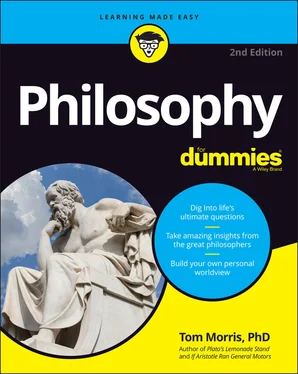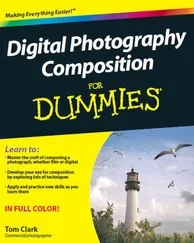Tom Morris - Philosophy For Dummies
Здесь есть возможность читать онлайн «Tom Morris - Philosophy For Dummies» — ознакомительный отрывок электронной книги совершенно бесплатно, а после прочтения отрывка купить полную версию. В некоторых случаях можно слушать аудио, скачать через торрент в формате fb2 и присутствует краткое содержание. Жанр: unrecognised, на английском языке. Описание произведения, (предисловие) а так же отзывы посетителей доступны на портале библиотеки ЛибКат.
- Название:Philosophy For Dummies
- Автор:
- Жанр:
- Год:неизвестен
- ISBN:нет данных
- Рейтинг книги:4 / 5. Голосов: 1
-
Избранное:Добавить в избранное
- Отзывы:
-
Ваша оценка:
- 80
- 1
- 2
- 3
- 4
- 5
Philosophy For Dummies: краткое содержание, описание и аннотация
Предлагаем к чтению аннотацию, описание, краткое содержание или предисловие (зависит от того, что написал сам автор книги «Philosophy For Dummies»). Если вы не нашли необходимую информацию о книге — напишите в комментариях, мы постараемся отыскать её.
Philosophy For Dummies
Philosophy For Dummies
Philosophy For Dummies — читать онлайн ознакомительный отрывок
Ниже представлен текст книги, разбитый по страницам. Система сохранения места последней прочитанной страницы, позволяет с удобством читать онлайн бесплатно книгу «Philosophy For Dummies», без необходимости каждый раз заново искать на чём Вы остановились. Поставьте закладку, и сможете в любой момент перейти на страницу, на которой закончили чтение.
Интервал:
Закладка:
You are often confronted in everyday life by lots of competing claims and alternative proposals you need to assess: Should you find more funds to increase the quality of your product, or concentrate instead on more advertising? One group of experts says that children flourish with more freedom. Another group claims that they require more clear limits and discipline. One political candidate claims to have the best policies and character. A rival candidate calls that guy a dangerous traitor. How do you evaluate and assess such competing claims? Philosophy trains the mind in the fine art of assessment.
 All that glitters is not gold. Appearances and realities can diverge. We live today in a world of hype, exaggeration, and hyperbole. Falsehood abounds. Plato’s Cave of Misleading Appearances is bigger and deeper than ever before (see Chapter 2). Illusions rule the world. Everyone has something to sell, and you’re bombarded every day by claims you must be able to evaluate. In a world of conflicting views vying for acceptance, you need to know how to separate the wheat from the chaff, the sheep from the goats, the real truth from groundless conspiracy theories, the collectibles from the trash. Caution is necessary. You need discernment. And discernment — the overall ability of good assessment — is a skill that philosophy can nurture. As the ancient poet Ovid noted, “The judgment of man is fallible.” We need all the help we can get.
All that glitters is not gold. Appearances and realities can diverge. We live today in a world of hype, exaggeration, and hyperbole. Falsehood abounds. Plato’s Cave of Misleading Appearances is bigger and deeper than ever before (see Chapter 2). Illusions rule the world. Everyone has something to sell, and you’re bombarded every day by claims you must be able to evaluate. In a world of conflicting views vying for acceptance, you need to know how to separate the wheat from the chaff, the sheep from the goats, the real truth from groundless conspiracy theories, the collectibles from the trash. Caution is necessary. You need discernment. And discernment — the overall ability of good assessment — is a skill that philosophy can nurture. As the ancient poet Ovid noted, “The judgment of man is fallible.” We need all the help we can get.
In philosophy, you learn to assess a view by asking for evidence or other legitimate reasons to think it’s true. You enhance your ability to evaluate how one proposal for your acceptance may fit or fail to fit with other things you already have strong reason to believe or even know to be true. You are less likely to fall for wild conspiracy theories or clever lies meant to manipulate you and gain your allegiance.
 In assessing a worldview or major philosophical position, just as in evaluating a business claim or overall political stance, you should always ask the following three basic sorts of questions, which can be called the 3 Cs of Assessment:
In assessing a worldview or major philosophical position, just as in evaluating a business claim or overall political stance, you should always ask the following three basic sorts of questions, which can be called the 3 Cs of Assessment:
C1: Is it coherent? Do the various components of the view or position hang together logically? Does it make sense? Is it internally consistent? Is it inwardly congruent?
C2: Is it complete? Does it touch on and deal with all the relevant issues that it ought to take in, or does it have gaps and blind spots? Are any concerns swept under the rug? Is it comprehensive enough?
C3: Is it correct? For a position to merely be coherent and complete isn’t enough; the available evidence must point in its direction as the correct contender for truth. Coherence is necessary; completeness is important; but only correctness, in addition, gives you what you fully need. An internally consistent viewpoint that’s comprehensive in its sweep but at odds with the facts doesn’t do you much good in a practical way.
These, therefore, are the 3 Cs of assessment: coherence, completeness, and correctness. A philosophical position, similar to a business plan, may be correct as far as it goes, without going far enough. A viewpoint may be correct, within limits, without being complete enough. Consider a management theory that says companies prosper best when all their executives share a strong sense of purpose. That may be true, but it’s an incomplete perspective. As a matter of fact, a business can flourish best when everyone, not just the executives, shares a strong sense of purpose. And maybe customers and supplier need to be let in on that purpose as well. Such an assessment tells you that the original view needs more development. A philosophical view or theory may even be correct in its main principles but incoherent in some of its less vital components — in which case, it needs some logical retooling before we can accept it as a whole. We must check for and identify all three qualities of coherence, comprehensiveness, and correctness in order to evaluate it well. Keeping this concept in mind, you can greatly enhance your skills of assessment through a philosophical examination of any big claim or position.
Using argument
Philosophy cultivates our skills of analysis and assessment. It also schools us on the correct use of argument .
Arguments are not, in philosophical terms, shouting matches, verbal tug-o-wars, or personally abusive altercations. You may often find yourself amazed at what people seem to think constitutes a reasonable exchange of differing ideas these days. Arguments on television often feature squared jaws, red faces, and bulging veins, along with such rejoinders as “Oh yeah ?”, “Who says ?”, and “That’s just your opinion!” Social media is usually even worse. Many people seem to misunderstand what a logical argument essentially and at its best really is.
EXPLORING REASON
Analysis involves the use of reason . So does assessment. The same is true of argument. But what exactly is reason? The philosophers all use it and urge the rest of us to do so, even as they point out its limits, as well as its strengths.
We can think of reason clearly as one of the powers of the mind, like perception or imagination. It is the power of moving logically from one idea to another, of seeing connections through logic or the considerations of cause and effect, and of arriving at justified conclusions from given starting points. By the power of reason, we can often best see where truth is to be found.
“Use your head!” you may urge a friend, meaning to advise a use of reason. (“Use the common sense God gave a squirrel” could be a less complimentary version of the same advice.)
In the history of philosophy, some great minds have thought that reason could do everything — from discerning the truth of “First Principles,” or the most basic facts about the world, to deducing all less fundamental truths from those same principles. Others have insisted that widespread experience of the empirical world — seeing, hearing, touching, and so on — is necessary for gaining substantive truth about life. Swinging from one extreme to the other, from the primacy of reason to the importance of experience, characterizes a good deal of the history of philosophy, as it does most of life, for that matter. The truth is not usually at an extreme. A person is often called a “rationalist” who views reason as very powerful and who wants an argument for the proof of almost anything he or she believes. By contrast, a person is often called an “empiricist” who, by contrast, just keeps hammering away on the importance of sense experience for confirming anything we believe. The sentence, “I’ll believe it when I see it” is a typical empiricist claim. But even the most experientially oriented philosophers value the role of reason in analysis, discernment, evaluation, and inference, or logical argument.
 In philosophy, an argument is a reasoned presentation of ideas, where you marshal evidence in favor of the truth of a conclusion. Arguments, in their essence, aren’t something you direct at people as you would a gun you’re aiming at a target. You don’t primarily argue with someone or at someone; you present an argument for a conclusion, which you often intend as a means to persuade someone else, but you also sometimes employ an argument just as a way of discovering for yourself the truth. As the French essayist Joseph Joubert once pointed out, “The aim of argument, or of discussion, should not be victory, but progress.” Good arguments can make for good progress.
In philosophy, an argument is a reasoned presentation of ideas, where you marshal evidence in favor of the truth of a conclusion. Arguments, in their essence, aren’t something you direct at people as you would a gun you’re aiming at a target. You don’t primarily argue with someone or at someone; you present an argument for a conclusion, which you often intend as a means to persuade someone else, but you also sometimes employ an argument just as a way of discovering for yourself the truth. As the French essayist Joseph Joubert once pointed out, “The aim of argument, or of discussion, should not be victory, but progress.” Good arguments can make for good progress.
Интервал:
Закладка:
Похожие книги на «Philosophy For Dummies»
Представляем Вашему вниманию похожие книги на «Philosophy For Dummies» списком для выбора. Мы отобрали схожую по названию и смыслу литературу в надежде предоставить читателям больше вариантов отыскать новые, интересные, ещё непрочитанные произведения.
Обсуждение, отзывы о книге «Philosophy For Dummies» и просто собственные мнения читателей. Оставьте ваши комментарии, напишите, что Вы думаете о произведении, его смысле или главных героях. Укажите что конкретно понравилось, а что нет, и почему Вы так считаете.












